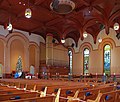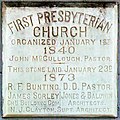History
A Presbyterian congregation met in Galveston as early as 1839, when Reverend John McCullough delivered sermons there. In May 1840, McCullough with two other ministers and an elder established a Presbytery. [2]
The Presbyterian congregation was organized in 1840 with the assistance of missionaries from the United States, and it met in a wooden church building from 1843 to 1872, the first church building in Galveston. The current Romanesque building was constructed in 1872 and is considered one of the best examples of Norman architecture in the region. It was designed by Nicholas J. Clayton, a prominent early Texas architect. The church was added to the National Register of Historic Places in 1979. Currently, the congregation is affiliated with the Presbyterian Church (U.S.A.), the Synod of the Sun, and of New Covenant Presbytery. [3]
Church Interior
Dedication Stone
This page is based on this
Wikipedia article Text is available under the
CC BY-SA 4.0 license; additional terms may apply.
Images, videos and audio are available under their respective licenses.






